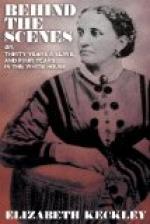* * * * *
Attendance at church.
There was an observance of religious forms at least by the occupants of both the great house and the cabins. The McGee family were church-going people, and, except in very inclement weather, never failed to attend service on Sunday. They were Methodists, and their church was four miles from their residence. The Baptist church was but two miles distant, and the family usually alternated in their attendance between the two places of worship. I always attended them to church, generally riding behind while the Boss drove. Upon reaching church, my first duty was to run to a spring for a pitcher of fresh water, which I passed not only to the members of our party, but to any others desiring drink. Whatever may be thought of the religious professions of the slave-holders, there can be no question that many of the slaves were sincere believers in the Christian religion, and endeavored to obey the precepts according to their light.
* * * * *
Religious meetings of the slaves.
Saturday evening on the farm was always hailed with delight. The air was filled with happy shouts from men and boys, so glad were they that Sunday, their only day of rest, was near. In the cabins the women were washing and fixing garments for Sunday, that they might honor the Lord in cleanliness and decency. It was astonishing how they utilized what they had, and with what skill and industry they performed these self-imposed tasks. Where the family was large it was often after midnight before this work was done. While this preparation for the Sabbath was in progress in most of the cabins, the old men would gather in one for a prayer-meeting. As they began to sing some familiar hymn, the air would ring with their voices, and it was not long before the cabin was filled with both old and young, who came in their simple yet sincere way to give praise to God. It was common to have one or two exhorters




